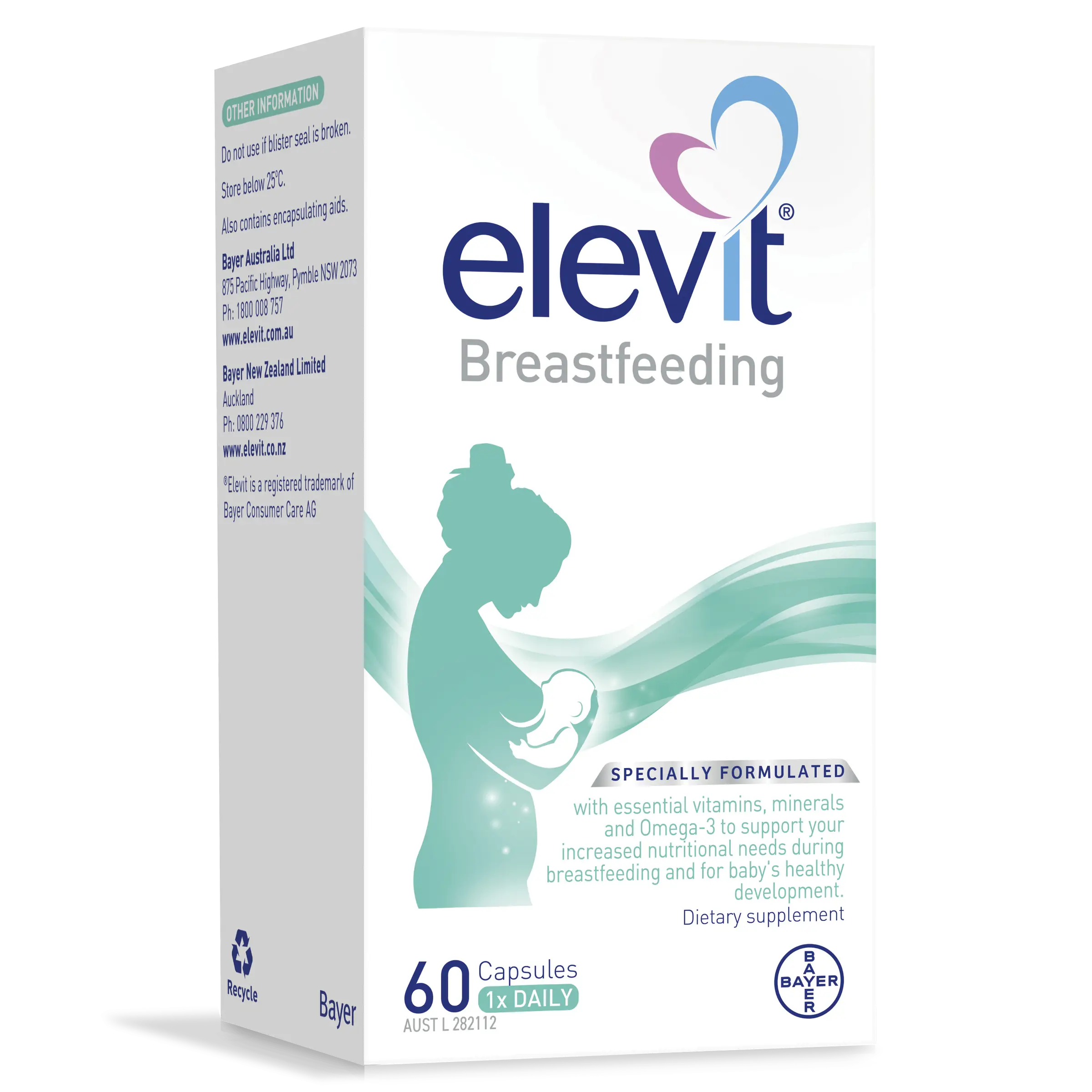Mum's Nutrition

On this page
It's important to maintain good eating and exercising habits during pregnancy and after birth as it gives your child invaluable nutrition in the early developmental stages of their life.
If you simply want to drop back to your pre-baby weight, give it time. Remember sensible eating goes hand in hand with regular exercise so take every opportunity to be active.


Advertisement
Elevit Breastfeeding
Guidelines for healthy eating for new mums
-
1
Vegetables, including different types and colours, and legumes/beans.
-
2
Fruit.
-
3
Grain (cereal) foods, mostly wholegrain and/or high cereal fibre varieties, such as breads, cereals, rice, pasta, noodles, polenta, couscous, oats, quinoa and barley.
-
4
Lean meats and poultry, fish, eggs, tofu, nuts and seeds, and legumes/beans.
-
5
Milk, yoghurt, cheese and/or their alternatives, mostly reduced fat (reduced fat milks are not suitable for children under the age of 2 years).
-
6
They also recommend drinking plenty of water.
Read the Australian Guide to Healthy Eating for more ideas.
Food for breastfeeding mums
Tresillian supports the importance of breastfeeding your baby during the first six months of life and beyond if this is your chosen method of feeding your baby. Breast milk is the ideal food for your baby’s healthy growth and development.
If you’re a breastfeeding mum, it’s particularly important that you’re eating a well-balanced diet to make sure your baby is getting the right amount of vitamins and minerals.
The Australian guidelines suggest that you need extra nutrients but not lots of extra kilojoules when you're breastfeeding. This means it's important to choose nutrient dense foods rather than energy dense. Your diet should also be rich in protein, calcium, iron and vitamins to maintain your health and wellbeing.
What foods should you avoid when breastfeeding?
It's always better for our health to limit discretionary foods at every stage of life. These include:
- Foods high in saturated fat such as sweet biscuits, cakes, hamburgers and pizza.
- High fat spreads such as butter (they can be replaced with avocado or hommus).
- Drinks with a high sugar content such as cordials, energy drinks and sports drinks.
What drinks to avoid when breastfeeding?
Drinking plenty of water each day is recommended for new mums. Keeping a bottle of water handy is a great way to make sure you stay well hydrated.
In terms of alcohol, for women who are pregnant, planning a pregnancy, or breastfeeding, the safest option is not to drink alcohol at all.
Drinks containing caffeine such as tea and coffee should also be drunk in small quantities whilst breastfeeding, as small amounts can flow through to breastmilk.
How to lose weight when breastfeeding?
One of the most common questions from new mums is ‘how can I lose the extra weight gained during pregnancy’.
It’s not recommended to start a low calorie diet during pregnancy or during the early months of your baby’s life, however you can make some lifestyle changes.
- Scheduling exercise in to your day. We have some tips below.
- Limit your diet to a healthy range of foods.
- Try storing low calorie, nutritious snacks in the fridge such as carrot sticks, apple slices and snow peas, that are easy to munch on if you’re feeling hungry.
- Be prepared by cooking double quantities of nutritious dinners so you can eat one meal and freeze another.
- Be patient. The most important focus right now is to take care of yourself and your baby. With healthy eating and exercise, you are giving your body every chance to naturally return to your pre-baby weight over time.
Exercising with a new baby
-
1
Go for a power walk with your baby in the pram in the morning or afternoon. If your baby doesn't like the pram, you could try a baby carrier.
-
2
Ask a friend or family member whether they can mind your baby while you go for a walk.
-
3
Set up a regular morning or evening walk with your partner (and baby).
-
4
Join a gym with a creche. This offers the added benefit of having a short break from your baby, meeting other parents and getting in a workout.
-
5
Look for mums and bubs exercise classes in your area. These classes are baby friendly so you can usually place your bub on a mat or in the pram near you while you work out with others.
FAQs about mum's nutrition
It’s normal to gain weight during pregnancy as you grow and support your baby and prepare to breastfeed after birth. However gaining too much weight can put you at risk of gestational diabetes and put your baby at greater risk of becoming overweight later in life.
The amount of weight gained varies from person to person and depends on your pre-pregnancy weight. Your doctor is the best person to speak to about this.
While breastfeeding does burn up a lot of kilojoules, it can take some time to get back to your usual weight, so try and be patient.


Advertisement
Elevit Breastfeeding
Elevit Breastfeeding contains essential vitamins, minerals and omega-3 to support your baby’s ongoing healthy development.
Visit Elevit








































